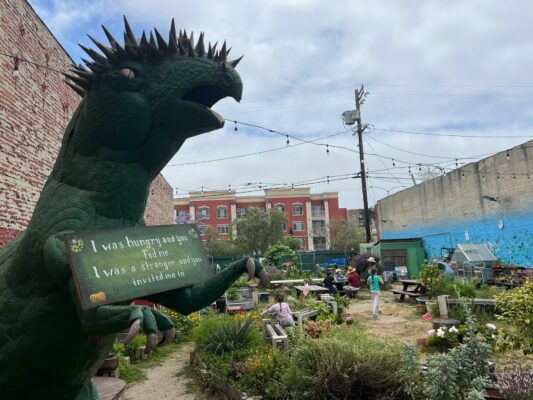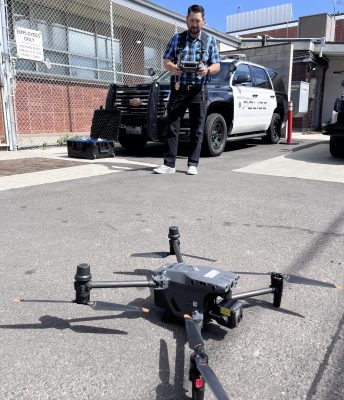
Mitch Chang was fresh out of high school in Honolulu in 1990 when he went to the U.S. Army recruitment office with the intention of signing up to serve as medic. His hope was to get training that might later help him pursue a career in medicine.
He paused while filling out the paperwork. “What’s the worst that can happen in two years?” he thought to himself. “We are not going to war or anything, are we?”
Then he signed up. By the end of the year, Chang was off to Iraq as part of the invading force. He was part of the mechanized infantry; he drove a tank.
“So I went to the desert,” Chang said. “…I almost got killed. It was miserable. Thank God I don’t have nightmares or anything like that, but I do think about it almost every day – not in some traumatic way, but it’s always there. At the same time, a lot of funny things happened.”
One distinct memory was the day he packed up to go in his tank. Chang had a choice to make: he had room either for an anti-tank weapon – a bazooka – or his guitar. Very reluctantly, he left the guitar behind.
“I wish I had played ukulele at the time,” he said. “That would have fit.”
His choice of bazooka marked one of the very last times in his life that Chang did not make a decision based on his love for guitars. He has since repeatedly risked everything he possesses in order to share this love.
Chang is a rising star in the Los Angeles music scene, not as a guitar player – although he plays very well – but as a somewhat unlikely impresario who has brought world class musicians to what had been an unlikely venue. Chang has been the promoter behind the Los Angeles Guitar Festival, the Los Angeles Flamenco Festival, and the Southern California Slack Key Festival, critically acclaimed events which take place each year at the Redondo Beach Performing Arts Center, a former high school auditorium that has been transformed into a state-of-the-art theater.
It turns out it took a Korean from Hawaii to bring world class Spanish flamenco, slack key Hawaiian music and some of the finest guitarists alive to South Bay audiences.
Revered flamenco guitarist and UCLA professor Adam del Monte, in an interview earlier this year, aptly summed up the contribution Chang has made to the regional musical community as a promoter.
“If you looked up idealism with realism and very big cojones, the picture of Mitch Chang would show up,” del Monte told KPFK radio. “It’s the combination of all the above and the ability to really forge ahead with something of such weight and quality, especially inside the musical métier of LA – it’s essential.”

Six string love
Chang has loved music intensely since he was a first grader.
His early childhood memories include a teacher who played recorder so beautifully that it transported the young Chang to a state of near-delirium. A little later, he remembers his two older sisters playing flute and clarinet and thinking to himself that the music they played had a special power. He dabbled with the ukulele as a first grader, then piano, and then played drums for several years. In high school, it occurred to him that it’d be much easier – and perhaps a bit more hip – to lug around a guitar rather than a drum set.
Chang was always a worker. He worked at a Jack in the Box, at Sears, and delivered papers in order to save up and buy a Takamine guitar. He played as a fairly gifted hobbyist through high school, but it wasn’t until he returned from Iraq and attended the University of Hawaii that he realized he wanted to devote his life to music. He was still thinking of pursuing a medical career but also taking classical guitar classes. It was clear immediately that he had a special aptitude for the guitar. As usual, his drive as a worker made it apparent.
The GI Bill didn’t pay his whole way for college. Chang was working at the campus post office days and at a Denny’s at nights to make do. He took his first guitar class in the fall of 1993. By Valentine’s Day the next year, he was paying his way through school playing gigs.
“I’ve got to say, I got good at guitar pretty fast,” he said. “I thought, ‘Oh, this might be what I want to do.’ I had some older friends then and had seen them playing at hotels and restaurants. One day early into the guitar program, a professor asked me, ‘What do you see yourself doing with guitar?’ I said, ‘Well, I’d really like to play at hotels and restaurants.’ That’s pretty pathetic, I suppose.”
Nearing graduation, another professor asked him if he’d like to accompany some flamenco dancers as they practiced. He declined, saying he didn’t care for the style. She insisted, suggesting the style would fit his temperament. Chang arrived at the rehearsal and discovered the guitar player who preceded him had run off to Vegas to marry one of the dancers.
Flamenco gave Chang flight in another way. When he played flamenco, everything he felt seemed to pour through the strings of his guitar.
“For me, all my happiness, sadness, my anger, it all combines into one, and that is how it makes me feel,” Chang said. “Not to sound corny, but I think it just kind of makes me feel, period.”
Chang became one of the better flamenco players on the islands, and began promoting shows that brought performers in from all over the world. One of those performers, del Monte, changed the course of his life – when he heard del Monte play, he decided on the spot to move to California to learn more about flamenco guitar.
“I said, ‘I am moving to California, dude.’ I just didn’t know you could do that with flamenco guitar…It just totally moves me,” Chang said. “It’s so much more emotional than anything I could think of.”

Guitar dreams
By 2008, Chang had established himself as a flamenco guitarist, gigging throughout Southern California as much as five nights a week. But the Slack Key Festival Chang would organize in Redondo Beach in January of that year would announce him as larger musical force to be reckoned with.
Chang’s festivals are unlike anything that has been presented locally. He carefully assembles the artists he will present – some people believe, for example, that his initial Slack Key Festival may have been the most illustrious gathering of Hawaiian musicians ever assembled on the mainland – and transforms the entire 1,400 seat performing arts center into a more plush venue that feels like Nokia Theater LA Live moved south. There are guitar booths, food, drink, masterfully orchestrated stage sets, and special VIP meet-and-greets with the artists post-show on the venue’s patio.
But it doesn’t stop there. Chang orchestrates the entire evenings in ways that even astonish the artists themselves. Jim “Kimo” West, a guitarist best known for playing with “Weird Al” Yankovic, who is also a respected slack key player, recalled when Chang opened the first festival with West, Jeff Peterson, and Barry Flanagan from the group Hapa. None of them had ever played together before. All were skeptical.
“We thought, ‘How is he going to pull that off?” West said. “…We had an hour before the show, literally, then it was, ‘Okay, let’s do it.’ Mitch had this great idea, starting out as silhouettes, three figures standing up there, then all of a sudden, bang, going into song. Afterwards I said, ‘Mitch, I’ve got to hand it to you. I was not really confident this was going to work.’ He is a visionary. It was a total hit.”
Chang had wagered his entire life savings presenting the festival, which by no means was a sure-fire attendance magnet – slack key isn’t pop music. But the festival was an immediate hit, followed by an Aloha Falsetto festival later that year, which was also a success. He did the same two festivals in 2009, and then in 2010 doubled down, presenting the area’s very first Flamenco Festival. In 2011, he presented his most audacious show yet, bringing together arguably the greatest acoustic guitar players on the planet – Tommy Emmanuel and Lawrence Juber – to headline the first LA Guitar Festival.
James Jensen, the founder of Solid Air Records and one of the preeminent producers of acoustic guitar music, said that the Guitar Festival was unlike any other event in the nation. The only comparable festival is a two-week long affair in New York. He particularly praised Chang’s choice of artists – every name on the bill both this year and last is an accomplished master, all players revered within musical circles even if some are not as well known popularly.
“This is a very, very different thing that Mitch is doing – he’s bucking all kinds of fashion trends,” Jensen said. “This is basically a rare example of substance over style. We are in a culture that is the opposite – it is all celebrity-based, not talent-based. Mitch’s shows are about talent. He respects artists, and that is why they love to work with him – he’s not a show business promoter type, but someone who cherishes talent and artistry. It’s not an easy way to make a living, and that is why we all need to support this kind of thing as much as possible – if real musicians can’t find audiences, they are going to start putting their instruments down.”
“Mitch Chang finds the best talent available and hopes people come, rather than say, ‘This guy is hot right now…’ He kind of reverse engineers it.”
Tom Schnabel, the influential KCRW deejay, has taken note of Chang’s festivals. “I’ve been involved with the music scene for over 30 years and can say with certainty that Mitchell Chang is the purveyor of musical treasure,” Schnabel said. “And we are all better for it, and should be aware of this man-behind-the-scenes.”










